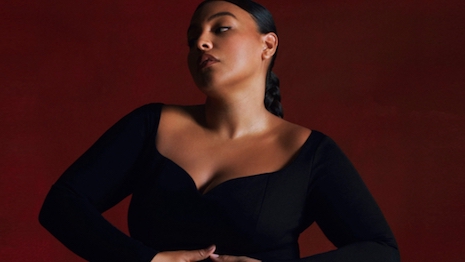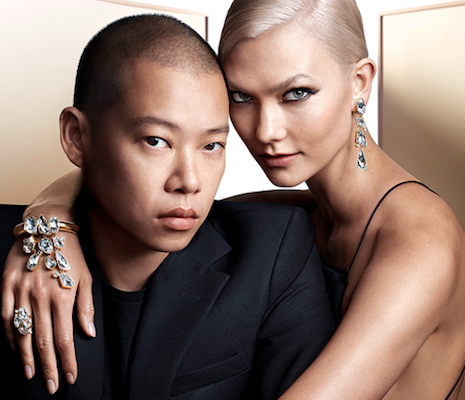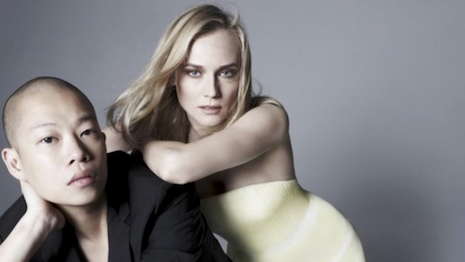NEW YORK — As perceptions of high fashion and luxury continue to evolve, brands and designers should become more open-minded about embracing different audiences.
With designer collaborations and capsule collections becoming more popular, brands are no longer pigeonholed into one category. At the Initiatives in Art and Culture's Annual Fashion, Jewelry and Design Conference event in New York, designer Jason Wu spoke about how brands can bring their luxury aesthetic to a wider price range.
"How do you elevate something without just using a very expensive fabric?" asked Mr. Wu, founder of his eponymous label. "It’s about clever design.
"My take on expanding the reach of a brand isn’t to dumb down what I do, it’s about elevating everything else," he said.
Mr. Wu's fireside chat was led by Gary A. Wassner, cofounder and chariman of InterLuxe Holdings, LLC.
Embracing aesthetic
Over the course of his career, Mr. Wu has not shied away from collaborations – from jewelry brands to mass market retailers – that expand his label’s reach.
Previously, Mr. Wu released a limited-edition collection with Target, including pieces ranging in price from $20 to $60. Most recently, he collaborated with plus-sized online retailer, Eloquii, on a special holiday line.
"It wasn’t about doing what I do for less," Mr. Wu said. "It was about elevating the plus market."

Jason Wu for Eloquii. Image credit: Eloquii
Mr. Wu’s work is defined by its refined femininity — his pieces are glamorous without being fussy. He does not focus on trends, instead relying on timeless midcentury silhouettes.
"My aesthetic was always very clear," Mr. Wu said. "Over the last ten years, it’s what’s brought me the most success, when I’m true to myself.
"It took me 10 years to really own that," he said.
 Jason Wu for Swarovski Crystals. Image credit: Jason Wu
Jason Wu for Swarovski Crystals. Image credit: Jason Wu
His career has seen other changes as of late.
Earlier this year, Mr. Wu left German fashion label Hugo Boss after five years at the helm of its women’s collections. Since joining the label in 2013, Mr. Wu had helped shape the direction of its women’s wear with his signature style (see story).
"Having to work in a company [with] 2,000 stores globally really taught me how to amplify a vision," Mr. Wu said. "My biggest accomplishment there was helping them figure out their overall aesthetic means."
New thinking
As the habits of luxury consumers continue to evolve, Mr. Wu encourages out-of-the-box thinking.
Competition is growing as ecommerce makes it easier to shop different brands at different price points from around the world. However, Mr. Wu appreciates that the in-store experience still matters.
Luxury retailers need to create welcoming spaces to allow consumers to fully immerse themselves in brand messaging. Physical experiences and amenities remain a key loyalty driver, despite the growth of ecommerce in the luxury sector (see story).
As he prepares to launch bricks-and-mortar stores in China, Mr. Wu finds himself considering what the Jason Wu world looks like, and how to bring that intimate experience into a retail setting.
Brands also need to be aware of cultural and environmental differences when appealing to global audiences.
Mr. Wu noted that the Chinese prefer to buy separates, while American women favor his dresses. Warm climates and longer summers also makes it difficult for his label to sell fall and winter items.
"Whoever said there’s no climate change, ask a designer," Mr. Wu said.
While he admits his label is not technically "sustainable," its still important for Jason Wu to put its best foot forward.
Luxury brands are becoming more aware of how sustainable practices impact their businesses, but they are not necessarily adept at incorporating environmentally friendly processes on a wider scale. Socially responsible tactics include use of non-toxic materials, buying back leftover textiles and even supporting workers' unionization efforts (see story).
"We make clothes that are not disposable at any price point," Mr. Wu said. "Sometimes its good to have a little less and a little more quality."
{"ct":"5wrwcLNLXWZENPbUUx4We15ZZ7ION4zKpbaAqwPMqPXvjghuAi0p2+px7hKY1TQxH4a6LFZgqPwZf5EwVueLoJN4pQq0AVMs\/cGF6cFBULz0U4L0Iq44013XnQ6vaQRAykzIOxjYIgSXd2\/LdxqVJ0xNxQvjWdtqxMgGFZi+1QGcwAs+edmJdCUUyQeg4GHA4xQOoZTlMPD8Cm7azRyenXYZAjjZApx5\/SJe17R7HIa0mX2VjNwUUxJZUgUm+MxQx+cS8Twf5X2GjFx2iEk\/PP\/ETmpkvSHVICYa2xd\/otfBF7\/LyaG107rVjbMJ0hYrsw3u2vkQuIIQo\/Yj89pzjNJFbmoNzJf+kihc1SIdO2q9zgkk5IncIQhe7EScva58EjyN88X5+hB6dsfS90cHdqCMykxTQxiv4a03b\/KNTUMrG+DZ7\/g8CLC3DqbqlffuLIZUFUAjtvfNOaOJZSmr\/cC\/tKjAioacfzrjs22FZzxjEPyReDgqbeC8OL1y9P48mZ1C5TdPYFcbQf990qZY10+Xbj\/IQSGpgu7Mj7hnagTajnDFkvWODFn8FHhZxBn8pJfrBjGWvfYsomiMy+As+JsvrXpDuvSqFYNEn9fbP1RbvoNAZ9YMxiK18ghthmmZYmOVyNPYNsBwsIxKohc1rnmu8g\/nDyaLn+7IowBIny4mKlsP69c4NWGeX5oziLWHpx82Egtt6ybV0zo43yYO\/cZxn5qbTVerJWc\/KvoADYTShjA9zNPNCJyQ6tFi7TCYbJKve8knO7YzacfXOuGrqX3a3CgkugqPRX2vDEkehsqnf7x6D9NSrUDSHrQ3Ipsv4RBzTocsRD9CC82UGR8Eg8dDxA\/09JBRzzU72CDkcU97JrGe1mq2m9jeQGYBqkZMhBZfN2X8VNC9UHcM6v5xxePmkymWa7DohUy\/R00vEW4x4phjSKaGTdtmrYhJnFTI8t1eUCOtBjQDTCzmWiHT7XP381lW2Zt5B4jSlsRTyDQ1Ax8g1IlM5FiyQ2KLxJcZWsY\/HF0\/NSQC8gDXymI1m8Ta\/tf5sDajXuZ6rXxLhM0imfaFdo4h7n624iBiDDbeBVVLZtFRhAGDZFu142A7GXe8pi0kzyFGpwct4liYKPLV9RHAp5BWp5xzaqOhzGbb5EvBfkBcbjZUkbMwuwNdLsG3ZzbYxx2JKEFw61KXxgc0\/ZKH11MWwIlX1SNxLimOyUMw8FMsmUj2ivLSCHoQHPc0upc+elovlo5IV2uOe4uKmotktwr+R5JqkL\/nrcnbknmBPxQ6Ur6faJvQC5nFfzeAuQCT0u5wOP7eiWbFq0J9L6vPye5R6q1N5LUhj5KM6tvnfCgvMDIPCP0Ji1BthUxo3hNTyxnzqqx1usemVA2bBjUHdpa0Aep0KLQjXBGuE9MxDCULjj7+u5cHaOul8E99Q8Bzi\/umjSQ22TNBXqwKbpnS9mRx7xT6ZOEPzxekGzbiDmTizY9sRTnd9KoUhqW9tMQn1mXksX1sgwgnbXJjcBxrDESKrisv8bJDFGeuA3EecPIED5HuexNBkDWdsNhQAr7tyulw47rosBhE1yWKQE72H275tiYcrpDgawlBtqMnrFq8FUpjiRpbyH\/s88eYudCfcQymdIHKCDaFSO9XmuM3pB2HYuN6sPG4Hd0geg+zl4L7ZA1L9CqVjI7OC+sUF4tcKafEuLEI8G1AfNOCE1Exl+E0qM55ssNIHdPqJZPEKud25+QQY38NnvVBfPx0pMFdC+\/dSZcskmxG7Uwa8Ifp3TeZJvBpl8Iu4X\/2Y03xpBBu4G+v0GEBcewhZgKqZAhzMCfy2B8D+ljre2zQp+W5BYbBGzUcfo1gP59XfxCs6p8thfUOfYvTL8j59yTqe3nocN5Qn\/U74hmiTZi89HMyxAmMRC0pR7fAwKIX1JdMGVxUA7IXSsgdblMbUVxMEwkB3HGOKL7XMkEpKOItdlus\/S+GXAKFfjvnGy4KrJ3FCT+sr61DbU90IvBFJEGihwvpdwh\/or0BiWxz1Ae2VffmYlgDMyXNE\/yH\/9fSRRGAckw92vcmfd2K42ubkH2iiT3meoRCkPZT3oTDJlhwaOq5gTbwzHfoWNHRJYRZ42JMDiYwd1GAtLKIewcptBfBCAQvtR+RsZH1NEYgjtw26UHMeFGJXuAmWYYksTlk8s7M02q1OMl1Tir3Bl7Ar6rEZ2W75Udf6HTJ\/xk03sNqugUO67lB83V4NBE6kkAIef2mV8t18SDta8i1Mx8623VFON+lRAdeZ76IpftT+CDOb0r5YjeXJdJW6mPuu22TylMgdnQzlv8rFw+EwdGQ38YT\/yUAcNaJv2j2lBtmLBdAWQr2Dl7ByB2eJwRcCA4zpfnpBcYZYi8T+jYInLn+1fVsfVA4BjAsPVGHG1n529CsprEBt5KQYxTuf6Jzx\/rQS+\/4zv2S5JRfGrkTQOBUlbOO1ccYFh0tSG5d+pjmQ3b+IQu3qXnkfIp4XrddwQLnd3QKmfCRMYr\/jGkvuKxadig6huW94k1s+7aO4oM4gRC2DaF65P+dWGScxpcS8rFLQ88otahRvHO3\/B+BFMdatx+wIiHKoH1C5eQpPxAlaXsG5Hj+YM93gWiemh8yHDX\/Eera3zOSKQmiEp4xfjQybwGk+HQSlcaP7w\/YKRlmmlM0tVgJ2\/ofraxDJdyDqmsI7WkOMoqs5PbZOIzHPyjHpAQ5fHO6htKk+7zllY0cHZlGCnJLEFISKuGYxaPzpmpg\/4RCY2ZP\/4WCsaXLjIBL0K79EaNkDloc7BE9wID7gLOJz2ni3tgOxr9bAQAgNa66U4Eie2qaBRAFm1oYydZlIhUyrm1t9LiNiQdKF6Ae06+uZj5Ix4It7CJVdpXgKGXjRZAKlCYFan5iWPB43p\/fsHqh3mYrY1IXXDku75mwa1IN45TwbjeE\/aE4vbeq4mJnH6ykzz6MR\/M0L9AKHbOmZSxNU6mPgd2F4Ht4vEE64wDzvlXhUfwHqeB8lFZkRbqZlYjsAQB\/W\/bK7cN3cy3hEZNfb+nmtWPF7pw7geI4f8JxQ3Qqzpr84VWxCllFeMcfUdnCTgeDGEOkfy0syWSce6qjiyAN8+b7ZT7pBd6aZC2LmAhIbsqyH94xE7c2W0fjmRWvLTrU8SX6WxexSEElBT+i4RdiC7xQQyr3nqOFDDRfZR8IvUiBzlbqZMBJoHY4HmbxYLhPOCy6juGdFIKM\/x79Y8hWbIXBHrSnoQbewVIOi06C9ce4gevTam0Ajh\/12DrIt2hugpGiN5NUQ8ZaVc8A7KvFYuxTgZEbkxiYgZhpG5\/67fMhKYwbEKwuQH0Oz51rAy2DG1jP9mwQafoinbdBuRAagw0BwuM94zRHUORxiZqoNrEeZSzqezOBRxbyGAusTcCqz8jJX6g5+CRrDfLnJnGWupG2AveVBv8vuSk4DvXxsu96TUKIbTY9ahTZJHH\/C45Q9smwN5QLOJzRcdvTORLVORRqpRAr3J49z+ui\/W\/WsI7bNQLoUBet8RO3LClWN+y6PBfgmtGF5NxT2AjK48zrWEgYaeHrtOxZjoqKflq5nJasHW9aiGbAkIKLnWUVFWIWgeYQVrte5PKWiHT9JsbLnT7c9UitdTn87fMRlWFIxP7unqfnr8syJnmMiT2wFfxoUCqnjpsF8tOYYbTU0E4ybdSsLn4lVaOG4OLoxHYTdKcOAOWqBUwgFwT9io3LnqoTKSaYCiqpeWkmRc5Ab3E8EcrUkWaJcUgUvk9euKWXrl0wN+7+gC0h+sS4WpAa0LLI++KLEhhBwRiMkn2ALuS4Ldm9B8WDxfW8seO5ij1reL2wxMnICDTLcuVKbnAIS7rhegamYPjYOELEDmiICYy5SASv9d9K6lYR73ELtkPFoFfGVGVWnSA6KjJcyo0pDElWs2EqiYEj7RDe4bp1oLDVioS8s3Ste9iQj7KDCKVuUjF4YsM9Ja\/leuRlXrlRNfBBc8oPLVL\/ZTO47lSKotHJ2ufmbuzx4\/RsQILIa4Ld8To8LJQc\/20CAjnb7q9zENi7A6qeyBlEZlq0QS64lFoUDWLlWInuH5Y5EkWjRUUFK4i6BoWXf5nxcczESVmJUEJlKt2\/5ZRY\/OSIuQP8RHqcFl6259rPlv9eOONlg+oEVn4V+Y5Q60Mbgtdrj2RfzUvjNKeLHgj+fuS51F1c\/vHnPp5nNKw66syF5hEa\/dZ+NDu15HqAXeq2vveK9OP09wCpcNIp0d\/9G+CccKF2rWZHeUX99mB\/x3qnqVVw2VO8osyf48wMW1x91DlQk\/odPZgl+LaKTO6EmhadduQvoyCtqXUO\/suWRe7nXjVBqTCf1LENjYfBeQ1mUjosuiZ8kincAzYbBmgCi6Hp5CJtoVo1s3S6+8zETDT+j2p8LRgIXLgml6Voej0kqOYS1QvYJLAiV33y8IUJdrZTQkE+2fVtn6jps2Tg1Ez0eCQdbjj\/lkG4Ypnv5VJjdro85B8bE04kB\/tSWEYED3KHhAZLKpZt3v5CGQcOtwWgGxQ90ElukwN71UAigiwuR43E+24mx78kbLI9Zs7FFXJdwYq5fNF1L6VXbd6FXg5tleS\/r5Vnnb5vKdJknsyIRbcc3jsBVf7rgudZy+Oz4P5vbaSlyXg6KFJQ6sLeAEA\/fVJIpA5ZF2uL1VN22OJr23Nfl+K5RGmKPVWuBceTgqQLmFnTvM128AOVcGb93Bg14MO0JGs2lF1e2dEJwulXEv75yILhxGNI45evCExCpZfue\/ujNwMhxt4NzGXXw3qewdI\/W5wfje+NJCa8aO9d4gumBY3DtgNQV3gNUr58mUAYEdsj4YG8SLQfMYnIqA7\/2zYLHEc7UKZHv\/A\/s52rtkfF811VsCOxzJY13FGY\/ZNQ0Rm7Oh2h8udclEqDbtq0ENcZpXhaRD7Phyec5nxmZ10KZa1hwVn70bZiK1tlfcen0ghjwnRELxAt\/CaPAbyVzfrzfBMrcshVQABZBz+JGhmYlzzIdPHL0rXXquX\/Uw87wUFagFMu4CH5Cjn6Ft9RZkZthJlWg\/tl6cWmZyE83ueeb4Vqyzam3VZEtApnniGR4F\/IobOk0w4d2PjYsB7Z1xYVBWkTekNevsrHs+JR5Ax4rx9JCiYfFArsl9swnqVA\/pfeGNWuA7w4ZjxZq25FmJXSEaUOWygaNVie7f4NSP7TjbrjuIDcSBjfsc+Yl8fwZk4K\/RGfo3ybWNT3BaNLEXSAViz\/Of1cz2H8yv\/E\/xn11eTDNREp8MwCY7dQSHaY97iz48S8Y15xQT6KInYjg1P1sJFdDS5OUoXx0VCkgvbSTPioi2xk78iQaSeHmYIFGul9SceGccmuAmqJMg5jrnp\/B3Q+YQb2ep8UUG\/4sl+IDtrRIIfBhHj0vfaJXvTN8wKzJ+LdIvpvmtKdUdIZ1t9jg7Qstxa1+stcS\/rNCL2KE6fw2xhD7zxd9IydNIRHKGep3xhxIq9SIwYqh7bh1K8HKWi2xEUTbsr8XPVqxx2rISIINxsWusAhpK4VCEksQdxzZ7z2upr4Q++ub4TdtoVy8hvthtTTpVxZ0CmEbOtNyEITKftENSgm5i4Cu0zZHnPklHBOI+iVUv6CFUGRCX9IMGKCenPjDBssciVhxZD\/uKrQYrr5Xb2o5YsmleA7dgJjGnzQBznpF5XlKkmCfx3OyJAwFxe\/lCpkEJzbR\/dPdZlVoTPypaibmCey0XTMgeC3jUNFNfB2Iz08TEvaiGPXU5FQjNZ+\/5CVSTYQu+Cdun+T6mf3MY+HzQbHdL+8b0MOPNmdCkWuWxyMaOyRlfSrFD3NCUq+h2rVjxePH5SGBjJEOVA7oGGecBBAWo5gMPODVBQy\/SN8rJ5\/KekswEBDveJQ8hAYfbab+JNbgeAmubJcclj2nS6SV3vP2B3H6LUVeBVZyyDmh2KW6Lbuwt2L5JEus1fHGoMiw51mEDVbsOWClwQ\/K0TBZfxb6d9AT87+OwvniIsRYrAJgfX8wyV1std1uiss3lypJ3Y0aEN6Rgk+Tdk852ExZitoROskru70JF8vKIgWuePZFnkUee2bJwXnFNoa2UW\/LbOX+W6Jpvj84kbtR06u6eK0jbOUIapyd2vweVluMVCk20vttD6OHoWiZPFIfpHUnTZ8uSqs0CY6PTEnMW15kmbEpcdOhcBKVarwaCmHg3LZPqDC5+cb\/en75KIcgLXp7Ika2X4bFVKwlxoRnZ0aJ+X0EjfbnF9OdI5c8So3GUBRt9KjCie+p0RGDExDyU\/KnKchiSR+8J2aH9J3JAg90UZvb3cLHwdcF4LZgt+JLZR5ygjes2s0bDSApve8BDKDMKZ\/VoA0fo9UHlv39FcOKpourZkwwJK7WxhRAc74JVVVGRkmPwh9m20Cnf9dzw5wO5+71soCKxjf1zHSOS7ZloMMGTuVkkUrBT8AaSWOXN1BcT7Co+qBhZdwXCnMGBdnTePpBqAfXU19FX57PR7ZOID61tXFjZNSfUSraURLBOXorIFvedNQyhtCJ4L7LzkExAPA1z4lnnxKmTy8KHlPm9O4sNiVFvPz2ROISRb4f0gpDe0D53rSTA1mTJHvfXQmiDzMk5\/gYMIujfxaw8dO84K7ECu9t0+3U4BgamS82\/J6gs2Fen0WhYe3bakZSR2p02jSvi8C2CrDQwE9x7G8LK6lJthRaYTZup9PUh6bNhU7LwwkqcupGL1cGlDIiZGH5YTt65\/X4GQQK5pus1PQ36GozHNqX5vJJTbJQmHmDSujOOvA2o4DZa0XFPPeXhEVmOKcUCMPBlO4SeYUpD1ch4isEbDRo00HknL2EfCUKWZYQCwhQyptY+xB3Pqr7\/hLWUOGEDdMLuWvUmcw\/\/171u6GjSu+NlGae8FRNqe1SDGtGEK4ssulMaoTwGIj6DmWDtRvge+lasPxQtm2Se6r13zbKG1p9YjnrkEU0DhW8kBDnwcg3rhOkr+zz\/2Q6yrichLR0E3NY9Z\/Z2zUsX4OFqJd2HUi\/LIfIxsWIJGnGaBxiURpxgPFs0yW8BcjDmWTXX1ffbCKLj4JM7PY\/rQtj+kO0svudhDT3JJ5bnZFZOk+UVuBBlmvEgTjF7ruK09LvSjIUgV3fPtOl\/J0wHgcTci\/XsrP6pd60A64Aqh8OKdTSSRNgnE3lg3gJurYTe4L3r7lg\/RJRsA2ksJZRqLktllcxZqYfovFvgRckojq3RnD78HFrlsGGDpmu\/d46tdmCE1oemROeBALa9RtVk3ZcKLhk0r\/bkcZKtXJ7uAzvqzJT1gFkaUiKrO\/IcPw4y1K5waC7ckm8lmUbdCCnK2VHj9+9DNQazHDyWAD4KDiHQ27Q3b3kkSu4gMI8P6RSe\/TGM84eul\/liQv6WQh6QHjXaqNSCVenxFcfG\/aNbkYq1hIfN2L4BT7471unxC\/M8NXjjp9jEUxfBhq9YQVY+M9VpkZnR95N09D5MSngioXaSb0EszN4tT0bqA45ybY\/k7rffInEJMBv0EG2JXZHNkQYs2eqlc+3r71uSxrHViSW3Yeh50pxBjlWrPw2dxjYDkN9Bn2kZNtdATrTV6LkRVsT0tgAXpeL06yrZSsw\/rEsMBx6maeRD0PsGqXJdjLavXxxoU+syFMQN+JGLXoizbKVuLHX+FRT2IcvYQ2ToKAvDZGBAy+MAbdEBGs6PKCRNytocDL5qATg++PLkPfFxn6dLcyicgi5FzpgFgU1h\/zZPBUd15WDrWNM2NI7bVgJE4EzSJY422w","iv":"723f63855e9cafd47780996a1fc97ea3","s":"42201b699cc13385"}

 Designer Jason Wu with collaborator and friend, actress Diane Kruger. Image credit: Jason Wu
Designer Jason Wu with collaborator and friend, actress Diane Kruger. Image credit: Jason Wu
 Jason Wu for Swarovski Crystals. Image credit: Jason Wu
Jason Wu for Swarovski Crystals. Image credit: Jason Wu